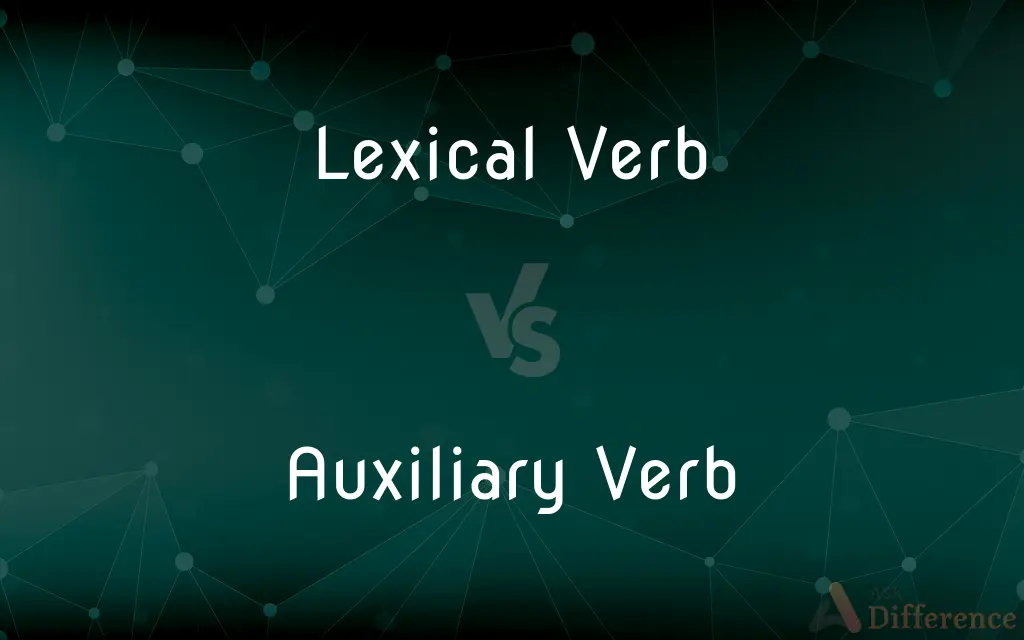Lexical Verb vs. Auxiliary Verb — What's the Difference?
By Tayyaba Rehman — Published on October 28, 2023
Lexical verbs convey actions/ states; example: run, think. Auxiliary verbs help to convey tense/aspect/mood; example: is, have, will.

Difference Between Lexical Verb and Auxiliary Verb
Table of Contents
ADVERTISEMENT
Key Differences
Lexical Verb and Auxiliary Verb exhibit distinctive grammatical and semantic characteristics in sentences. A Lexical Verb, also known as a main verb, is paramount because it signifies the main action or state of being in a sentence. Contrastingly, an Auxiliary Verb, or helping verb, augments the main verb, providing additional information concerning its tense, aspect, or modality.
When we examine a Lexical Verb like "run" in a sentence like "She runs every day", "runs" delivers the principal action. On the other side, an Auxiliary Verb like "have" in "She has run marathons" doesn't stand alone. Instead, it aids the Lexical Verb "run", specifying its perfect aspect.
Another angle to comprehend Lexical Verb and Auxiliary Verb is by analyzing their syntactical implications. A Lexical Verb like "sing" in "He sings" demands no support to convey meaning. However, an Auxiliary Verb like "will" in "He will sing" necessitates a main verb (Lexical Verb) to provide a full conceptual framework.
Interestingly, Lexical Verbs such as “laugh” or “sleep” can represent standalone verbs without additional support. However, Auxiliary Verbs, for example, "would" in “She would laugh” or "could" in “He could sleep”, cannot singularly convey a coherent thought without the presence of a main verb.
The intricate dance between Lexical Verb and Auxiliary Verb brings depth to linguistic structures. While the Lexical Verb carries the semantic weight of an utterance, the Auxiliary Verb intricately tweaks its temporal, modal, and aspectual nuances, enhancing the richness of language expression.
ADVERTISEMENT
Comparison Chart
Function
Expresses main action/state.
Aids the main verb.
Example
"She writes."
"She is writing."
Standalone Use
Can stand alone in a sentence.
Cannot stand alone.
Inflections
May have tense inflections.
Often lacks inflections.
Significance
Carries principal meaning.
Modifies tense, mood, etc.
Compare with Definitions
Lexical Verb
Lexical Verbs can be conjugated into different tenses.
He studied hard.
Auxiliary Verb
Auxiliary Verbs are fundamental in forming questions and negatives.
Is she coming?
Lexical Verb
Lexical Verbs can operate as standalone verbs.
Cats sleep often.
Auxiliary Verb
Auxiliary Verbs help indicate a verb’s tense, aspect, or mood.
They have eaten lunch.
Lexical Verb
Lexical Verbs can function without auxiliary support.
They eat vegetables.
Auxiliary Verb
Auxiliary Verbs precede main verbs in verb phrases.
You should try the cake.
Lexical Verb
Lexical Verbs possess their own semantic meaning.
Birds fly.
Auxiliary Verb
Auxiliary Verbs support main verbs, offering additional meaning.
She is going to the store.
Lexical Verb
Lexical Verbs denote primary actions or states.
She swims daily.
Auxiliary Verb
Auxiliary Verbs do not carry significant meaning on their own.
It will rain tomorrow.
Common Curiosities
What is a Lexical Verb?
A Lexical Verb expresses the main action or state in a sentence.
Can a Lexical Verb stand alone?
Yes, Lexical Verbs can stand alone, delivering full meaning.
Can an Auxiliary Verb convey complete meaning independently?
No, Auxiliary Verbs cannot convey full meaning without a main verb.
Is “be” an Auxiliary Verb?
Yes, "be" can serve as an Auxiliary Verb, e.g., "He is running."
Can a sentence have both a Lexical Verb and an Auxiliary Verb?
Yes, e.g., "She is reading (Auxiliary + Lexical) a book."
Can an Auxiliary Verb form questions?
Yes, e.g., "Is he coming?"
What is an Auxiliary Verb?
An Auxiliary Verb helps the main verb, providing additional tense, aspect, or mood information.
Can “have” be a Lexical Verb?
Yes, e.g., "I have a car."
Are Lexical Verbs vital for sentence structures?
Yes, they're crucial for expressing primary actions/states.
What is the function of a Lexical Verb?
It conveys the main action or state in the sentence.
What role does an Auxiliary Verb play in negations?
It is pivotal, e.g., "She does not like ice cream."
Can a Lexical Verb illustrate varied tenses?
Yes, by adjusting its form, e.g., "run" becomes "ran."
Can a Lexical Verb and an Auxiliary Verb be in a single verb phrase?
Yes, e.g., "She has been running."
Does an Auxiliary Verb carry semantic meaning?
No, it mainly provides grammatical context to the main verb.
Is it possible for a sentence to have multiple Auxiliary Verbs?
Yes, e.g., "She will have been working."
Share Your Discovery

Previous Comparison
Cream Cheese vs. Cream Cheese Spread
Next Comparison
Stock Dividend vs. Stock SplitAuthor Spotlight
Written by
Tayyaba RehmanTayyaba Rehman is a distinguished writer, currently serving as a primary contributor to askdifference.com. As a researcher in semantics and etymology, Tayyaba's passion for the complexity of languages and their distinctions has found a perfect home on the platform. Tayyaba delves into the intricacies of language, distinguishing between commonly confused words and phrases, thereby providing clarity for readers worldwide.













































